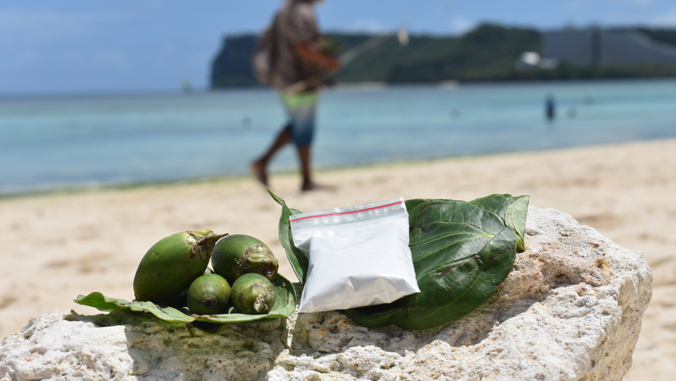
Adolescents in Guam have shown higher rates of tobacco products use compared to the general U.S. population. In Guam, as in many parts of Southeast Asia and the Pacific, areca (betel) nut use has been a traditionally and culturally accepted practice among adults and youths. Studies have shown that individuals who use substances such as tobacco and areca nut are at a much higher risk for cancer than those who do not.
To prevent tobacco and areca nut use and ultimately decrease cancer incidence in Guam, University of Hawaiʻi Cancer Center researcher Pallav Pokhrel, in collaboration with the University of Guam’s Francis Dalisay, a former UH Mānoa faculty member, received nearly $750,000 over a three-year period to lead a project that seeks to develop and test an effective tobacco, e-cigarette and areca nut use prevention program for implementation at public middle schools across Guam.
“This is the first time that a culturally-grounded tobacco and betel nut use prevention program is being developed for youths in the U.S.-Affiliated Pacific Islands,” said Pokhrel. “It’s important to provide younger individuals with skills to resist various influences that promote tobacco, e-cigarette and betel nut use. Preventing or treating tobacco use during adolescence has the potential to significantly decrease cancer incidence and mortality on the island.”
The efficacy of the prevention program will be tested through a randomized controlled trial, where participants will be placed into one of two groups. The trial was recently registered with the National Cancer Institute, and investigators are now in the early phase of developing the program. They are conducting in-depth research with adolescents and adults in Guam, which will form the foundation of the culturally-grounded intervention. Once the randomized controlled trial is completed, the researchers will test whether the program can be disseminated and implemented across other U.S.-Affiliated Pacific Islands.
“If this study is successful, the project may be able to be used as a model for developing culturally-appropriate adolescent tobacco and areca nut prevention programs in the Pacific region,” said Pokhrel.
The study is funded by the Pacific Health Partnership for Cancer Health Equity (U54CA143727-11), and is one of several projects at the UH Cancer Center that are working through partnerships to reduce the burden of cancer in Hawaiʻi and the greater Pacific. As many areas throughout the Pacific experience a lack of medical care services, prevention and education are key to reducing cancer incidence and deaths.
This research is an example of UH Mānoa’s goal of Excellence in Research: Advancing the Research and Creative Work Enterprise (PDF), one of four goals identified in the 2015–25 Strategic Plan (PDF), updated in December 2020.

